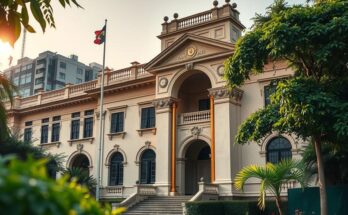The Bangladeshi government is prioritizing the recovery of laundered funds linked to 11 individuals, including Sheikh Hasina. Plans include establishing an Asset Recovery Agency and collaborating with international firms to seize foreign assets. Estimated losses from corruption range from $75 to $100 billion, with recovery strategies being implemented swiftly via legal channels and international cooperation.
The government has prioritized the recovery of laundered funds connected to 11 individuals and industries, including prominent figures such as Sheikh Hasina and former land minister Saifuzzaman Chowdhury. The aim is to resolve at least half of these cases through legal processes by the end of this year. An Asset Recovery Agency will be established and international firms will assist in seizing assets abroad.
During a recent meeting chaired by Chief Adviser Muhammad Yunus, plans were outlined to impose sanctions on the sale and transfer of laundered assets through cooperation with the UK, US, and UN. Shafiqul Alam, the Chief Adviser’s Press Secretary, indicated that legal measures would be expedited, with a special law formulated within a week to facilitate the repatriation of funds.
The central bank reported that between $75 billion and $100 billion has been illicitly withdrawn from the country, mostly laundered in jurisdictions including the US, UK, and Singapore. The ongoing investigations into these cases are being supported by the Anti-Corruption Commission and the National Board of Revenue, among other agencies, to ensure comprehensive recovery efforts.
Governor Ahsan H Mansur of Bangladesh Bank will meet with UK officials and legal partners to advance the asset recovery strategies, including a conference aimed at information sharing on March 19. In May, the government will co-host the “Bangladesh Asset Recovery Conference” in London to further coordinate international assistance.
The investigative panel is also collaborating with international law firms to recover assets exceeding Tk200 crore and to facilitate investigation processes. Ongoing dialogues with the Malaysian authorities have emerged amidst reports of a Russian “slush fund” linked to the Rooppur nuclear power project, where the Prime Minister is allegedly implicated in receiving bribes.
Regarding the 11 priority cases, the Bangladesh Financial Intelligence Unit (BFIU) has taken substantial steps, freezing 1,374 bank accounts worth Tk614 billion and seizing significant assets. Travel bans have been placed on 84 individuals associated with these cases, substantiating the ongoing comprehensive investigations designed to address money laundering concerns effectively. The legal and financial ramifications of these investigations are substantial, impacting both domestic and international perceptions of governance in Bangladesh.
In conclusion, the government of Bangladesh is taking significant steps to recover laundered assets involving high-profile individuals. With international cooperation and the establishment of the Asset Recovery Agency, efforts are being made to expedite the prosecution of these cases. The initiative aims not only to repatriate illicit funds, estimated between $75 billion and $100 billion but also to establish a more accountable system regarding asset management and anti-corruption measures.
Original Source: www.tbsnews.net




